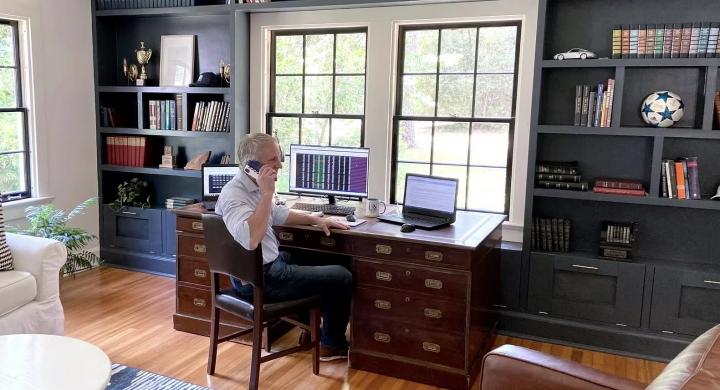
The world’s number one US growth manager, according to Citywire’s manager rankings, says fundamentals still rule, even as bubble talk grows louder. He’d rather put his trust in God.
For years, media have asked whether the tech-dominance in the US is sustainable. So far, the bubble call has aged poorly. America’s biggest technology companies have kept posting record earnings, and investors who stayed cautious have been missing out.
Few people have weathered the noise as well as Jeff Wrona. His One Rock Fund gained 69.5 percent in the year preceding August 31, defeating all other 716 managers in Citywire’s global US growth ranking. Based in North Carolina, Wrona tops the category not just over the past year but also on a three- and five-year horizon, delivering total returns of 130 percent and 249 percent, respectively.
He has achieved it in a market many believe is once again inflated, led by the same kind of technological revolution that defined his early career when the Dot-Com bubble shook markets. Wrona disagrees.
“If we are in the early stages of a bubble, we have a long way to go before the late stages,” he said. “Nvidia, and many others, are fundamentally performing today, with great short-term outlooks. We’ll see what happens long term, which is just a bunch of short-terms added up.”
That long view, he says, comes from experience, and from faith.
A servant investor
Few fund managers name their business after a prophet. Jeff Wrona did, after Jesus Christ, the One Rock. Fewer still have bible verses on their corporate website before the strategy.
“This is not my fund. It’s God’s fund,” Wrona said. “I’m simply a servant. I’m a steward of what is his. I work hard and try to choose the right things, but ultimately the results come from him. If results are not what I desire, or if they’re well above what I desire, it is his doing.”
That belief, he says, helps him stay calm when markets turn volatile. “The biggest risk for an investor or fund manager is fear,” he said. “Fear of poor performance. Fear of missing out. Fear of being in what’s going down. We have a Jesus who told us time and time again: do not fear, except God. If a stock goes down or I’m not in the hot area, I shouldn’t feel pressure to make a move out of fear.”
He insists that the philosophy is practical, not just spiritual. It reduces emotional trading and stops him from chasing fads. “Just remember,” he said, “I’m only a steward. Jeff Wrona is no big deal. But the one I represent sure is.”
Not a bubble, but a business
On the question that dominates markets, the possibility of a tech-bubble, Wrona is clear. Just like bubblepredicters, he draws a historical parallel to the dot-com era. The often mentioned Cisco, he notes, was the backbone of the internet build-out in the late 1990s, selling routers to startups and telecoms that were often unprofitable. One Rock’s largest holding Nvidia, by contrast, sells computing power to cash-rich giants such as Microsoft, Amazon and Alphabet.
“For AI today, Nvidia is often seen as the equivalent of Cisco then,” he continued. The difference is that Nvidia’s customers are among the most financially secure companies in the world. The end users are paying real cash for their customers’ services, and growth of users is much higher than the internet of 25 years ago.”
The chipmaker trades just over 50 times earnings; Cisco traded near 200 before the crash. “To talk about the valuation of Nvidia, given the outlook we have today, is ridiculous,” he said. “That thing is cheap. On forward revenues or forward earnings on a 12- or 24-month basis, they are not expensive. In fact, Nvidia is among the cheapest.”
According to its most recent public filing from June 30, 2025, the fund’s largest disclosed positions included Nvidia, Snowflake, Robinhood, Palantir, and Coinbase. Wrona said crypto-related stocks (like Coinbase and MicroStrategy) have contributed to returns but not significantly.
The fund’s turnover runs about 600 to 700 percent a year, meaning current holdings may differ. “I wouldn’t want anyone to think we necessarily own those stocks today,” Wrona said, declining to disclose the fund’s present positions.
Fearless concentration
Wrona dismisses the trend among institutions to move toward equal-weighted benchmarks as valuations rise.
“I can understand why there is a fixation on the Mag Seven given their index weightings,” he said. “But wouldn’t investors look at each company individually, like they do the other thousands, and make a decision to buy or sell? Equal-weighted versus market-cap-weighted S&P500 portfolio? Why would anyone want to own either? Why not choose the best 40 or 50 stocks and own those no matter their size?”
Asked if there are parts of the growth universe he avoids, he answered simply: everything not part of those 40 or 50 stocks. “But things can change quickly. What I’m avoiding today could be very attractive shortly.”
Trust and verification
Critics argue that investors like Wrona, who dismiss the market-bubble-risk, are extrapolating earnings too aggressively to justify lofty multiples. He rejects that.
After having been investing for 35 years, Wrona explains, the number of times he’s found companies lying, misleading, or outright lying has been much less than one percent.
“I take Microsoft pretty much at their word. I take Amazon at their word. I take Meta at their word in terms of business. Nvidia I take at their word, and a whole bunch of others. They corroborate each other and are essentially saying the same thing. Their revenues, earnings, guidance, margins, customers, and suppliers are all saying the same thing, and there’s evidence of it.”
“I trust in the Lord, but I believe the forecasts of these companies.”